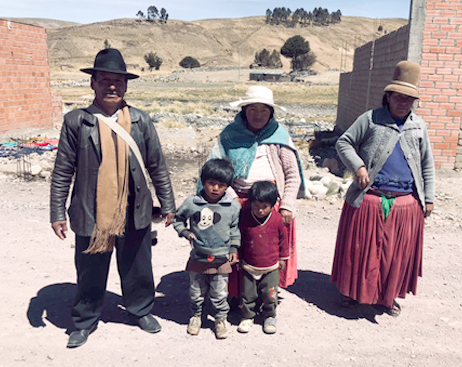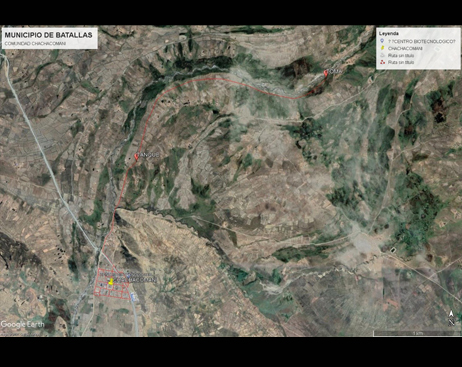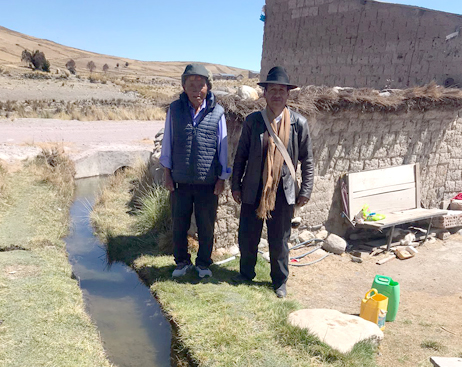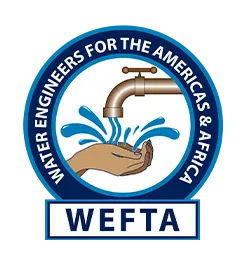
Chachacomani Water Project
$90,000 still needed to complete this project
Total Project Cost: $151,785
Project Location: Altiplano, Bolivia
Community Background
The community of Chachacomani is situated at an altitude of 4,010 meters (13,150 ft) above sea level. It is approximately 85 km (50+ miles) from the City of La Paz/El Alto. Approximately 1,000 people (over 200 families) live continuously in Chachacomani. This does not include others living outside the community who frequently come to Chachacomani for schooling, health post visits, and other social and communal activities. There is a primary school in the community as well as a secondary school, K-12 with approximately 130 students.
The typical houses of the community are built with adobe, straw, and aluminum/tin sheeting. The population of Chachacomani has its economy based on agricultural activity, mainly in the production of potatoes, quinoa and barley, and the grazing of sheep and cows. The topography is undulated with some steep slopes and areas of silty and stony soil. To the east lie the majestic snow-capped Andean mountains where glaciers still exist, though in retreat due to climate change.
Water, Sanitation and Health (WASH) Concerns
The community of Chachacomani lacks safe and reliable drinking water services. Currently, the community uses contaminated water from open wells and rivers/irrigation ditches with significant levels of turbidity, especially after heavy rains. These contaminated sources are located at long distances from the homes. In times of drought, water sources are diminished, requiring community members, primarily women and children, to walk and carry water for even longer distances.
Typical diseases include diarrhea (often a result of drinking contaminated water from the open wells and rivers); cough, pneumonia, rheumatism (arthritis), and most of all, acute respiratory infections; tuberculosis. Generally, the community members treat these diseases with natural and traditional medicine such as herbs. Often, a Yatiri, or Aymara healer, is consulted. If there is no improvement of health condition with these initial efforts, the community members will seek medical care at the health post run by the Batallas Health Center located in Chachacomani.
Only ten percent of the population has access to latrines.
The water, sanitation and hygiene situation is dire.
Proposed Project
Objectives
- Allow each family to access safe water with a home tapstand.
- Decrease the current effort to collect water, made primarily by children and women.
- Eliminate the current consumption of unsafe water from open wells and unprotected rivers/irrigation ditches.
- Increase water consumption per capita in food, drink, and hygiene.
- Reduce diarrheal diseases, which cause infant mortality.
- Make the water system self-sustaining.
Infrastructure Improvements and Local Capacity Strengthening
- 200 domestic services with potable water tapstands, all fed by gravity
- A spring catchment works
- Chain-linked fencing to protect the spring catchment works
- 2 ½” diameter supply PVC pipeline from the spring to the community storage tank, approximately 3,200 meters (2 miles) in length
- Semi-buried concrete storage tank with a capacity of 50 m3, or 50,000 liters (13,200 gallons)
- Distribution network with approximately 5,400 linear meters (3.35 miles) of PVC pipe between 3″, 2″, 1 1/2″, 1″ and 1/2″ diameters
- Valve boxes
- Aerial and buried river and stream crossings with pipe
- Overall, a reliable and sustainable spring-fed, gravity driven community water supply system
Results
- Decrease in gastro-intestinal diseases.
- Handling of food and utensils in a hygienic way.
- An increased sense of trust and confidence in the community members themselves, knowing that there are ways to improve their quality of life through shared sacrifice and partnerships with others of good will.
- A drinking water committee capable of repairing, maintaining, and managing a drinking water system.
Sustainability Considerations
Community Integration
This project was initiated at the request of the Chachacomani community.
Operation and Maintenance
The completed water supply system is expected to last well over 20 years. With its relatively simple design and all-gravity nature, it is very much a sustainable project for the community of Chachacomani. The system will be able to be properly operated and maintained with the community’s own resources, led by a local Chachacomani Drinking Water Committee. This committee will be responsible for the operation, maintenance, and administration of the service. Technical support from the Municipality of Batallas under whose jurisdiction Chachacomani falls will also be periodically available. It is expected that each participating family receiving a household tapstand will pay a monthly tariff of 5 Bolivianos (~75 cents US) to the Chachacomani Drinking Water Committee for the purchase of tools, spare parts, and future maintenance. The payment of the monthly contributions will begin after the delivery of the water system.
Project Management and Design
The Bolivian NGO Suma Jayma will be responsible for the implementation of the project. Jaime Rosa and Braulio Rojas of Suma Jayma have prepared this preliminary project proposal and are prepared to perform a complete topographic survey using Total Station surveying equipment donated by WEFTA, as well as complete the hydraulic calculations design using EPANET for the looped community water distribution system followed by a complete set of construction plans for all facets of the project. The system will be designed to be completely gravity-driven, ensuring that minimum dynamic pressure head and maximum static pressure head requirements are met throughout. Progress reports and updates on project implementation – including challenges faced, plus photos of the project’s progress, will be prepared by Suma Jayma monthly and sent to WEFTA.
Community Engagement
- Pay a contribution of 150 Bs. ($22.50)/family per household tapstand (connection fee).
- Provide manual labor during system construction.
- Pay a monthly contribution of 5 bolivianos ($.75), to the Drinking Water Committee, for the purchase of tools and spare parts for future maintenance.
- Attend meetings convened by the Drinking Water Committee.
- Attend the 4 talks on Health and Basic Hygiene convened in the Chachacomani community by the Batallas Health Center, with its Health Post.
- Assist the Drinking Water Committee with repair or maintenance work that is necessary.
WEFTA Volunteers
WEFTA will donate engineering and post-construction follow-up to this project equating to 15% of the total project cost.
If you would like additional information about this project, please contact us.
Donate to Chachacomani Water Project



In Bolivia,
21% of the rural population lacks access to improved water sources.
This project will provide safe and reliable water for over 200 families!
Our commitment is to the long-term success of the projects we’re involved with and it doesn’t stop when construction is complete.
